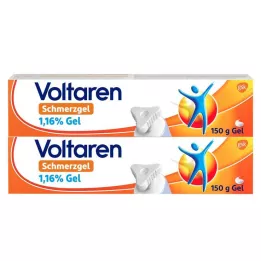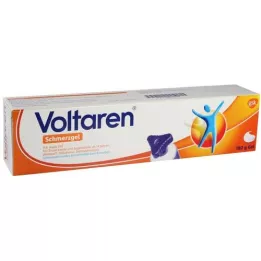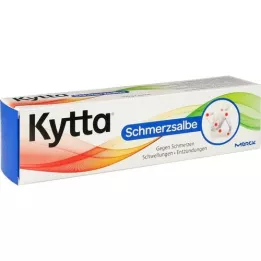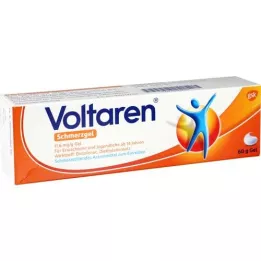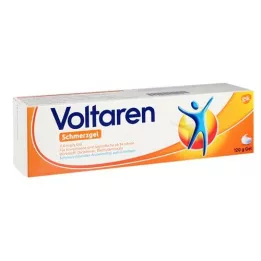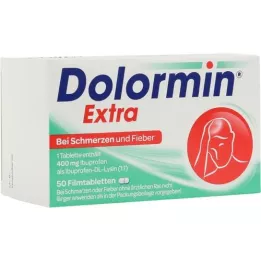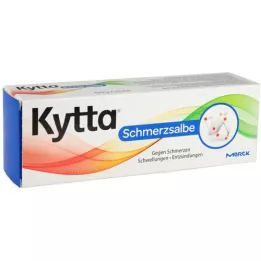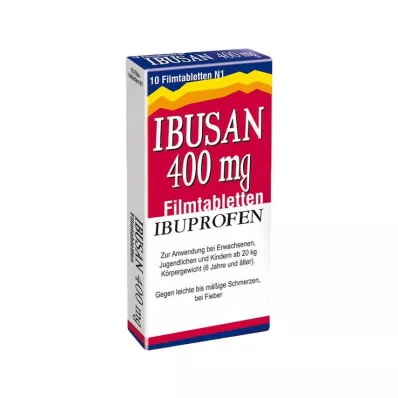
IBUSAN 400 mg film -coated tablets, 10 pcs
IBUSAN 400 mg Filmtabletten
Manufacturers: Blanco Pharma GmbH
PZN: 10090754
Dosage: Filmtabletten
Content: 10 St
Reward Points: 22
Availability: In stock
$3.58
from German pharmacies to your address

Instructions for use for IBUSAN 400 mg film -coated tablets, 10 pcs
Application notes
Type of application?
Take in the medicine with liquid (e.g. 1 glass of water).
Duration of the application?
Without medical advice, you should not apply the medicine for more than 4 days.
Overdose?
With an overdose, headaches, dizziness, abdominal pain, nausea, vomiting, drop in blood pressure, drowsiness and breathing disorders can occur. If you suspect an overdose, contact a doctor immediately.
Forgot to take it?
Continue the intake as normal at the next prescribed time (not with the double quantity).
In general, pay attention to a conscientious dosage especially in infants, toddlers and older people. If in doubt, ask your doctor or pharmacist about any effects or precautionary measures.
A dosage prescribed by the doctor may differ from the information on the package insert. Since the doctor coordinates you individually, you should therefore apply the medicine according to his instructions.
| Children from 6-9 years (with 20-29 kg body weight) |
1/2 Tablet | 1-3 times a day | at a distance of 6 hours, regardless of the meal |
| Children from 10-12 years (with 30-39 kg body weight) |
1/2 Tablet | 1-4 times a day | at a distance of 6 hours, regardless of the meal |
| Young people aged 12 and over and adults (over 40 kg body weight) |
1/2-1 Tablet | 1-4 times a day (max. 3 tablets a day) |
at a distance of 6 hours, regardless of the meal |
Application areas
Mode of action
How does the ingredient of the medicine work?The active ingredient belongs to a group of fabrics that act against pain and inflammation and lower fever. All three effects are mainly based on the inhibition of a body's own fabric, called prostaglandin. This substance must be available as a messenger material so that pain is felt, inflammatory reactions can be started or body temperature can be increased.
Composition
Contradictions
What speaks against an application?Always:
- Hypersensitivity to the ingredients
- Ulcers in the digestive tract, also in the history
- Bleeding in the gastrointestinal tract, also in the history
Under certain circumstances - speak to your doctor or pharmacist:
- Gastrointestinal complaints
- Inflammatory bowel diseases, also in history, such as:
- Crohn's disease
- Ulcerosa colitis
- Blood formation disorders
- High blood pressure
- Heart failure
- Limited kidney function
- Restricted liver function
- Collagenoses (changes in the connective tissue area), such as:
- Lupus erythematodes
- Mixed collagenosis (inflammatory rheumatic collagenosis)
- Porphyria (metabolic disease)
- Larger operation, took place shortly before
Which age group must be observed?
- Children under the age of 6: The drug should generally not be used in this group. There are preparations that are more suitable from the active ingredient strength and/or dosage form.
- Older patients aged 65 and over: The treatment should be well coordinated with your doctor and carefully monitored, e.g. by close controls. The desired effects and undesirable side effects of the medicinal product can occur in this group increased or weakened.
What about pregnancy and lactation?
- Pregnancy: The medicine should not be used according to current knowledge.
- Still -time: Contact your doctor or pharmacist. He will check your special starting position and advise you accordingly whether and how you can continue with breastfeeding.
If the medicine has been prescribed to you despite a counter -notification, speak to your doctor or pharmacist. The therapeutic benefit can be higher than the risk of using the application.
Side effects
What adverse effects may occur?- Gastrointestinal complaints, such as:
- Nausea
- Vomiting
- Heartburn
- Flatulence
- Diarrhea
- Constipation
- Stomach pain
- Bleeding in the gastrointestinal area
- Tea chairs, if you appear, please see a doctor immediately
- Gastric mucosal inflammation
- Ulcers in the digestive tract, which can very rarely break through
- Headache
- Dizziness
- Insomnia
- Fatigue
- Irritability
- Excitement
- Super sensitivity reactions of the skin, such as:
- Skin rash
- Itching
- Breath of breathing diseases
- Visual disturbances, please see a doctor immediately if you occur
If you notice a disorder or change during treatment, contact your doctor or pharmacist.
For information at this point, side effects are taken into account that occurs in at least one of 1,000 patients treated.
Hints
What should you consider?- The reaction capacity can also be impaired in the event of intended use, especially in higher doses or in combination with alcohol. Especially make sure that you take part in road traffic or operate machines (also in the household) with which you can injure yourself.
- Do not apply longer for pain or fever without medical advice than specified in the package insert!
- With permanent use of pain relievers, headaches can occur, which are generated by the pain reliever. Talk to your doctor to prevent your headache from becoming chronic.
- The habitual use of painkillers can lead to permanent kidney damage. If several pain relievers are combined, or if there are several active ingredients in a pain reliever, the risk increases.
- Caution: patients with nasal polyps, chronic respiratory infections, asthma or with a tendency to allergic reactions such as hay fever: The medicine can trigger a asthma attack or a strong allergic skin reaction. Therefor consult your doctor before usage.
- Beware of allergy to painkillers!
- There can be medicinal products with which interactions occur. Therefore, you should generally provide the doctor or pharmacist before treatment with a new medicine. This also applies to medicines that you buy yourself, only apply occasionally or that the application has been available for some time.
- Alcohol enjoyment should be avoided as far as possible during a permanent treatment . Occasionally alcohol consumption in small quantities is allowed, but not together with the medication.
Detailed instructions for IBUSAN 400 mg film -coated tablets, 10 pcs
Field of use
- The drugist is an anti-inflammatory and analgesic drug (non-steroidal anti-inflammatory/analgesic). It contains the active ingredient ibuprofen.
- The medicine is used at
- easy to moderately severe pain such as headache, toothache, regulation pain;
- Fever.
Active ingredients / ingredients / ingredients
400 mg ibuprofen
Carboxymethylar, sodium salt type a auxiliary substance (+)
Hypromellic auxiliary substance (+)
Potato thickness auxiliary substance (+)
Macrogol 6000 Hedge Terms (+)
Magnesium stair auxiliary material (+)
Corn starch auxiliary substance (+)
Cornstrength, pre -clerked auxiliary substance (+)
Silicium dioxide, high disperser auxiliary substance (+)
Talcum auxiliary material (+)
Titan dioxide HILDBOFT (+)
Contradictions
- The medicine must not be taken
- if you are allergic to ibuprofen or one of the other components of this drug;
- if you have reacted in the past with asthma attacks, nasal mucus swelling or skin reactions after taking acetylsalicylic acid or other non-steroidal inflammatory inhibitors;
- in the case of unexplained blood formation disorders;
- in the event of existing or repeated stomach/duodenum ulcers (peptic ulcers) or bleeding (at least 2 different episodes of proven ulcers or bleeding);
- in the case of gastrointestinal bleeding or breakthrough (perforation) in the history in connection with previous therapy with non-steroidal anti-rheumatics/anti-inflammatory drugs (NSAID);
- for brain bleeding (cerebrovascular bleeding) or other active bleeding;
- in severe liver or kidney dysfunction;
- with severe heart failure (heart failure);
- in the last third of the pregnancy;
- in children under 20 kg (6 years), since this dose strength is usually not suitable due to the active ingredient content.
dosage
- Always take the medicine exactly as described or exactly after the agreement made with your doctor or pharmacist. Ask your doctor or pharmacist if you are not sure.
- The recommended dose is:
- Body weight (age): 20 kg - 29 kg (6 - 9 years)
- Single dose in number of tablets: 1/2 film -coated tablet
- max. Daily dose in the number of tablets: up to 1 1/2 film -coated tablets
- Body weight (age): 30 kg - 39 kg (10 - 12 years)
- Single dose in number of tablets: 1/2 film -coated tablet
- max. Daily dose in the number of tablets: 2 film -coated tablets
- Body weight (age): > 40 kg (children and adolescents from 12 years and adults)
- Single dose in number of tablets: 1/2 - 1 film -coated tablet
- max. Daily dose in the number of tablets: 3 film -coated tablets
- Body weight (age): 20 kg - 29 kg (6 - 9 years)
- If you have taken the maximum single dose, wait at least 6 hours until the next income.
- The recommended dose is:
- Adult
- If this medicine is taken for more than 3 days in the case of fever and longer than 4 days in the case of pain or if the symptoms worsen, medical advice should be obtained.
- Children and adolescents
- If this medicine is required for more than 3 days in children and adolescents or if the symptoms worsen, medical advice should be obtained.
- Duration of treatment
- Side effects can be minimized by using the lowest effective effective dose required for symptom control over the shortest possible period.
- Please speak to your doctor or pharmacist if you have the impression that the effect of the drug is too strong or too weak.
- If you have taken a larger amount than you should
- Take this medicine according to the doctor's instructions or according to the dosage instructions given here.
- Central nervous disorders such as headaches, dizziness, dunging and unconsciousness (in children also seizures) as well as abdominal pain, nausea and vomiting can occur as symptoms of overdose. Furthermore, bleeding in the gastrointestinal tract and functional disorders of the liver and kidneys are possible. Furthermore, blood pressure drop, reduced breathing (respiratory depression) and the blue -red color of the skin and mucous membranes (cyanosis) can occur.
- There is no specific antidote (antidot).
- If you suspect an overdose with this medicine, please notify your doctor. According to the severity of poisoning, this can decide on the measures necessary.
- If Sie forgot to take it
- Do not take the double amount if you have forgotten the prior intake.
- If you have any further questions about taking this medicine, please contact your doctor or pharmacist.
Taking
- Please take the film -coated tablets unscrewed with plenty of liquid (e.g. a glass of water) during or after a meal.
- For patients who have a sensitive stomach, it is advisable to take this medicine during meals.
Patient information
- Warnings and Precautions
- Please speak to your pharmacist before taking this medicine.
- Side effects can be minimized by using the lowest effective dose required for symptom control over the shortest period.
- Security in the gastrointestinal tract
- A simultaneous use of this drug with other non-steroidal inflammatory inhibitors, including so-called COX-2 inhibitors (cyclooxygenase-2 inhibitors), should be avoided.
- Older patients:
- In older patients, side effects occur more frequently after using NSAID, especially bio-tongues and fractures in the stomach and intestinal area, which may be life-threatening. Therefore, particularly careful medical monitoring is required in older patients.
- Bleeding of the gastrointestinal tract, ulcers and breakthroughs (perforations):
- Bleeding of the gastrointestinal tract, ulcers and perforations, also with a fatal outcome, were reported during treatment with all NSAIDs. They occurred with or without prior warning symptoms or serious events in the gastrointestinal tract in the prehistory at any time of therapy.
- The risk of the occurrence of gastrointestinal bleeding, ulcers and breakthroughs is higher with increasing NSAR dose, in patients with ulcers in the history, especially with the complications bleeding or breakthrough, and in older patients. These patients should begin treatment with the lowest available dose.
- For these patients as well as for patients who need accompanying therapy with low-dose acetylsalicylic acid (ASA) or other medicines that can increase the risk of gastrointestinal diseases, a combination therapy with gastric mucosa should protect drugs (e.g. misoprostol or Proton pump inhibitors).
- If you have a history of side effects on the gastrointestinal tract, especially at older age, you should report any unusual symptoms in the abdomen (especially gastrointestinal bleeding), especially at the beginning of therapy.
- Caution is advisable if you get medicines that can increase the risk of ulcers or bleeding, such as: B. Oral corticosteroids, anti-blood clotting drugs such as warfarin, selective serotonin reuptake inhibitors that are used, among other things, to treat depressive moods, or thrombocyte aggregation inhibitors such as ASA.
- If you have gastrointestinal bleeding or ulcers during treatment with the medicine, the treatment is to be stopped.
- In patients with a gastrointestinal disease in the prehistory (Colitis Ulzerosa, Crohn's disease), caution should be used because their condition can deteriorate.
- Effects on the cardiovascular system
- Anti -inflammatory agents/painkillers such as ibuprofen can go hand in hand with a slightly increased risk of heart attack or stroke, especially when using in high doses. Do not exceed the recommended dose or duration of treatment.
- You should discuss your treatment with your doctor or pharmacist before taking this medicine
- having heart disease, including heart failure (heart failure) and angina pectoris (chest pain), or a heart attack, bypass surgery, peripheral arterial disease (circulatory disorders in the legs or feet due to narrowed or closed arteries) or any kind of stroke (including Mini stroke or transitory ischemic attack, "tia").
- Heavy prints, diabetes or high cholesterol levels or heart diseases or strokes occur in their family history or when they are smokers.
- Skin reactions
- Under NSAR therapy, serious skin reactions with redness and bladder formation, some with a fatal outcome, were reported (exfediative dermatitis, Stevens-Johnson syndrome and toxic epidermal necrolysis/lyell syndrome). The highest risk of such reactions seems to exist at the beginning of therapy, since these reactions occurred in the majority of cases in the first month of treatment. At the first sign of rashes, mucous membrane defects or other signs of a hypersensitivity reaction, Aktren should be discontinued and the doctor should be visited immediately.
- Use of this medicine should be avoided during a chickenpox infection (varicella infection).
- Other information
- This medicine should only be used with the strict weighing of the benefit-risk ratio:
- for certain innate blood formation disorders (e.g. acute intermittent porphyria);
- for certain autoimmune diseases (systemic lupus erythematosus and mixed collagenosis), since these patients have an increased risk of aseptic meningitis.
- A particularly careful medical monitoring is required:
- with restricted kidney function, since it can continue to deteriorate;
- for liver dysfunction; Liver dysfunction increase the risk of the occurrence of kidney harmfulness and damage, as well as for severe, possibly fatal liver reactions;
- directly after larger surgical interventions;
- with allergies (e.g. Skin reactions to other medicines, asthma, hay fever), chronic nasal mucus swelling or chronic respiratory diseases narrowing the respiratory tract.
- Severe acute hypersensitivity reactions (e.g. anaphylactic shock) are very rarely observed. At the first sign of a severe hypersensitivity reaction after taking Aktren Forte, the therapy must be canceled. The symptoms corresponding, medically required measures must be initiated by expert persons.
- Ibuprofen, the active ingredient of this drug, can temporarily inhibit the platelet function (thrombocyte aggregation). Patients with blood clotting disorders should therefore be carefully monitored.
- When the use of ibuprofen-containing medicinal products at the same time, the anticoagulant effect of low-dose acetylsalicylic acid (prevention of the development of blood clots) can be impaired. In this case, you should therefore not use ibuprofen-containing medicines without the express instruction of your doctor.
- If you are taking on medicinal products at the same time to inhibit blood clotting or to reduce the blood sugar, the blood clotting or blood sugar levels should take place as a precaution.
- If this medicinal product is permanently, regular control of the liver values, the kidney function and the blood count is required.
- When taking this drug before surgical interventions, the doctor or dentist must be asked or informed.
- The longer use of all kinds of painkillers against headaches can make them worse. If this is the case or if this is suspected, medical advice should be obtained and the treatment can be canceled. The diagnosis of headache in the use of medication (Medication Overuse Headache, MOH) should be assumed in patients who suffer from frequent or daily headaches, although (or precisely because) they regularly take medicines for headaches.
- In general, the habitual intake of pain relievers, especially when combining several pain relieving active ingredients, can lead to permanent kidney damage with the risk of kidney failure (analgesic nephropathy).
- When using NSAIDs, the simultaneous enjoyment of alcohol, active ingredient side effects, in particular those that affect the gastrointestinal tract or the central nervous system, can be reinforced.
- This medicine should only be used with the strict weighing of the benefit-risk ratio:
- Children and adolescents
- There is a risk of kidney dysfunction in dehydrated children and adolescents.
- Please note the information under category "Contraindications".
- Wateriness and ability to operate machines
- Since when using the drug in higher dosage, central nervous side effects such as tiredness and dizziness can occur, the reaction capacity can be changed in individual cases and the ability to actively participate in road traffic and to operate machines can be impaired. This applies even more in combination with alcohol. You can then no longer react quickly and specifically to unexpected and sudden events. Do not drive a car or other vehicles in this case! Do not operate any tools or machines! Do not work without a safe grip!
Pregnancy
- If you are pregnant or breastfeed, or if you suspect that you are pregnant or intend to become pregnant, ask your doctor or pharmacist for advice before taking this drug.
- Pregnancy
- If pregnancy is determined during an application of this drug, the doctor must be notified. You can only use ibuprofen in the first and second thirds of pregnancy after consultation with your doctor. In the last third of pregnancy, this drug may not be used due to an increased risk of complications for mother and child.
- Breastfeeding
- The active ingredient ibuprofen and its dismantling products only pass into breast milk in small quantities. Since disadvantageous consequences for the infant have not yet become known, breastfeeding will generally not be necessary for short -term use. If a longer use or intake of higher doses is prescribed, however, an early wing should be considered.
- Reproductive ability
- This medicine belongs to a group of drugs (non-steroidal anti-rheumatics) that can affect the fertility of women. This effect is reversible after stopping the drug (reversible).
Hints
Medicines Reviews
There are no reviews for this product.
Write a review
Popular in Muscle & joint pain
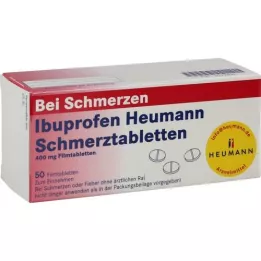
IBUPROFEN Heumann painkillers 400 mg, 50 pcs
IBUPROFEN Heumann Schmerztabletten 400 mg
$7.15 $14.29

